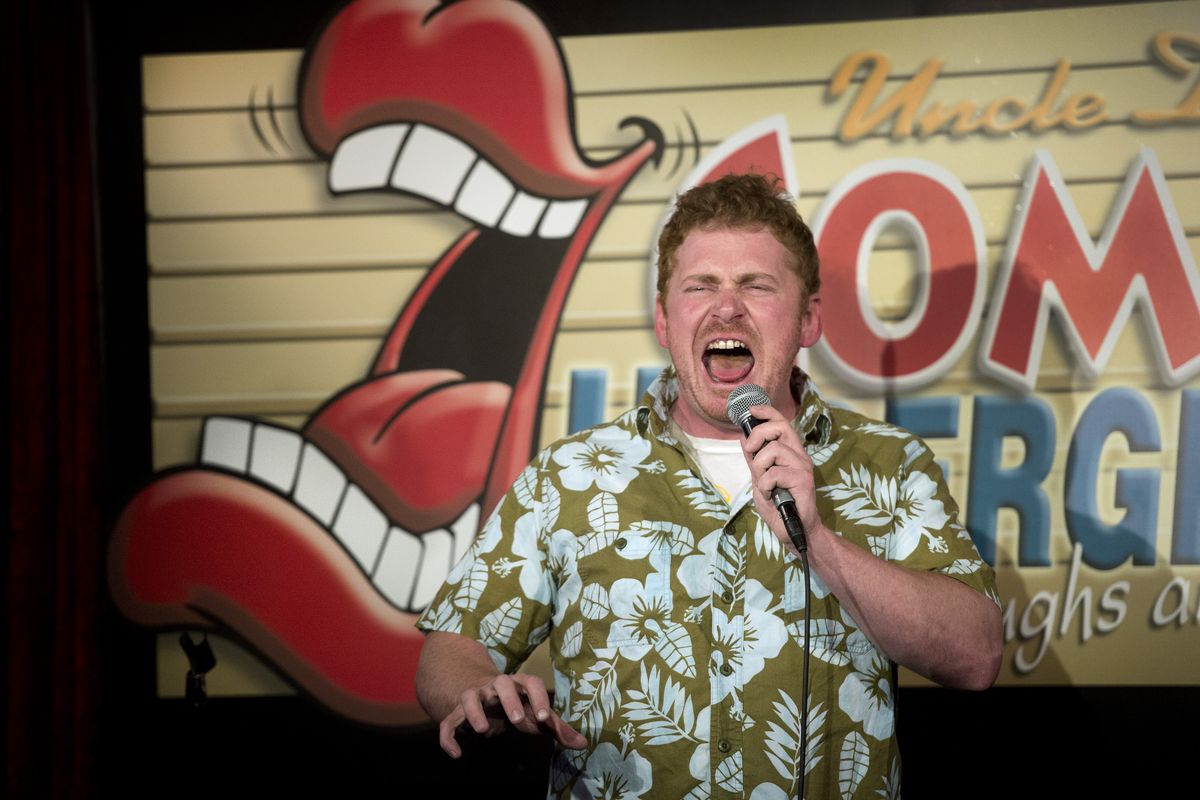The local stand-up scene is anything but a joke

It’s creeping past 10:30 on a Thursday night, and the back patio at Illinois Avenue Bar and Grill is probably the loudest corner in all of Spokane.
Eleven or 12 local stand-up comedians are crowded around a couple of plastic tables covered in half-empty pint glasses, haloed by a cloud of cigarette smoke, and they’re all talking over each other. Much of what they say can’t be reprinted in a family publication.
They’ve all come from the weekly open mic night at Uncle D’s Comedy Underground, which is, almost in defiance of its name, upstairs from the former music venue Bluz at the Bend. By the comedians’ accounts, the night went well: The crowd was responsive, they said, and some of their new material worked.
“With most of our open mics, it’s putting a microphone in a corner and going, ‘Shut up, please!’ and trying to tell jokes,” said comedian Steve Johnson. “And there’s always the guys in the back who showed up to drink, and they say, ‘I’m funny, I’ll talk over this guy.’ ”
“Sometimes you get audience members who just love what you do,” said comedian Michael Glatzmaier. “Sometimes you get people and they’re not there for you. They’re there for something else.”
That seems to be the primary hurdle to clear a standard open mic comedy night: How do you captivate everyone in the room, especially when they’ve unassumingly wandered into a makeshift comedy club?
“In Spokane, if you can find them, there’s almost an open mic every single night,” Glatzmaier said. “Some will randomly pop up, like, ‘Hey, we’re doing open mic tonight at Panda Express.’ ”
Johnson quipped: “And you get one egg roll and a diet soda.”
“We have a lot of open mics, but we’re talking about good open mics,” Glatzmaier continued. “Sometimes you’ll get, like, 30 comedians and five audience members.”
“You’re not going to get 60 or 70 comics a night like you’d get in Chicago,” said comedian Carl Shaw, “but you’ll get 18 to 20 comics who are going to get up there and give it their all and do a good job with the crowd.”
“When I tell people I’m a comedian and I do open mics on Wednesday, Thursday, Friday and Saturday if I can,” Johnson said, “they go, ‘Wow, there’s that many comedy rooms?’ People don’t know there’s a scene here.”
That scene is fueled by a do-it-yourself spirit – if you can’t perform on a real stage, find a makeshift one. For every open mic at an actual comedy club like Uncle D’s, there are two more in unlikely places – Neato Burrito, for instance, or Chan’s Red Dragon Chinese restaurant. The same comedians who frequent Uncle D’s are usually seen at those, and they’re often performing for one another: If any of the stand-ups are heckled by someone in the audience, odds are it’s the comic who’s getting up to perform next.
Around 11 p.m., Don Parkins – Uncle D himself – wanders over to the table, and his entrance is met with applause.
Parkins, who has worked as a comedian and stage hypnotist for more than three decades, owns Uncle D’s and has mentored countless aspiring stand-ups. When he starts talking, it’s the only time in the evening when the assembled comics are silent.
“Our main focus is to generate talent,” Parkins said. “Some people come in and they have no aspirations to become professionals. Others hope and believe that there’s something inside of them that can kick them up a notch so that they can make a living at it. And that’s how it works – the progression is you work for free, then you work for hot dogs, then $20, then $50, and pretty soon you can work your way into the system.
“Some people have that desire, and when they do, we go out of our way to make sure they have that opportunity.”
Getting that kind of opportunity, however, doesn’t necessarily mean people will listen. Comedian Harry J. Riley compares performing stand-up in Spokane to playing for a minor league baseball team: You’re participating in the same sport as the guys in the majors, but there are fewer spectators in the stands.
“I think the biggest misconception about Spokane comedy is that it’s a lower grade of comedy, because there’s not that many professionally paid comedians here,” he said. “We want to be known as a complete city, just like Seattle. Any big city is going to have to diversify their entertainment options. It’s very important that Spokane has a comedy scene, for the same reason Seattle dug having a music scene. All it takes is one person to burst out of that scene, and then that town is on the map.”
A few local comics have busted out in recent years – Dan Cummins and Jeff Dye among them. But those still working the Spokane circuit aren’t just in it for the recognition or the money – although they admit that both would be nice.
“This seems like the most ridiculous job ever to be paid for, and it’s all I want,” said comedian Jamie Boyd. “When I get paid, I’m like, ‘I cannot believe you just paid me for this.’ After my first touch of that, I’m like, ‘I want to do this forever.’ ”
“The bottom line for me is my love, my passion and all these guys for trying,” Parkins said. “It takes a lot of guts to get up underneath a light in front of people. You don’t have a band behind you – all you’ve got is a microphone and a light. More people are willing to die than speak in public, so I have admiration for that. I would go the extra mile for them always.”
And with that he leaves, ordering two more pitchers of Coors Light for the table on his way out, and the crowd goes wild.